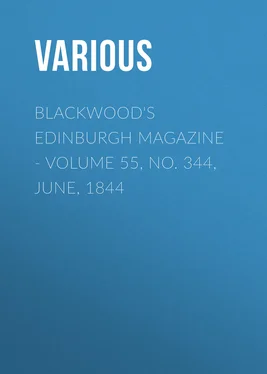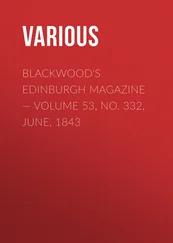Various - Blackwood's Edinburgh Magazine. Volume 55, No. 344, June, 1844
Здесь есть возможность читать онлайн «Various - Blackwood's Edinburgh Magazine. Volume 55, No. 344, June, 1844» — ознакомительный отрывок электронной книги совершенно бесплатно, а после прочтения отрывка купить полную версию. В некоторых случаях можно слушать аудио, скачать через торрент в формате fb2 и присутствует краткое содержание. Издательство: Иностранный паблик, Жанр: foreign_antique, periodic, foreign_edu, на английском языке. Описание произведения, (предисловие) а так же отзывы посетителей доступны на портале библиотеки ЛибКат.
- Название:Blackwood's Edinburgh Magazine. Volume 55, No. 344, June, 1844
- Автор:
- Издательство:Иностранный паблик
- Жанр:
- Год:неизвестен
- ISBN:нет данных
- Рейтинг книги:4 / 5. Голосов: 1
-
Избранное:Добавить в избранное
- Отзывы:
-
Ваша оценка:
- 80
- 1
- 2
- 3
- 4
- 5
Blackwood's Edinburgh Magazine. Volume 55, No. 344, June, 1844: краткое содержание, описание и аннотация
Предлагаем к чтению аннотацию, описание, краткое содержание или предисловие (зависит от того, что написал сам автор книги «Blackwood's Edinburgh Magazine. Volume 55, No. 344, June, 1844»). Если вы не нашли необходимую информацию о книге — напишите в комментариях, мы постараемся отыскать её.
Blackwood's Edinburgh Magazine. Volume 55, No. 344, June, 1844 — читать онлайн ознакомительный отрывок
Ниже представлен текст книги, разбитый по страницам. Система сохранения места последней прочитанной страницы, позволяет с удобством читать онлайн бесплатно книгу «Blackwood's Edinburgh Magazine. Volume 55, No. 344, June, 1844», без необходимости каждый раз заново искать на чём Вы остановились. Поставьте закладку, и сможете в любой момент перейти на страницу, на которой закончили чтение.
Интервал:
Закладка:
As an example of the accuracy with which Le Sage has imitated his originals, we quote the annexed passages from Marcos de Obregon—Page 3.
“En leyendo el villete, dixo al que le traia: Dezilde a vuestro amo, que di goyo, que para cosas, que me inportan mucho gusto no me suelo leuantar hasta las doze del dia: que porque quiere, que pare matarme me leuante tan demañana? y boluiendose del otro lado, se tornô a dormir.”
Конец ознакомительного фрагмента.
Текст предоставлен ООО «ЛитРес».
Прочитайте эту книгу целиком, на ЛитРес.
Безопасно оплатить книгу можно банковской картой Visa, MasterCard, Maestro, со счета мобильного телефона, с платежного терминала, в салоне МТС или Связной, через PayPal, WebMoney, Яндекс.Деньги, QIWI Кошелек, бонусными картами или другим удобным Вам способом.
1
Midsummer Night’s Dream.
2
Dolmen; literally, stone table . Remarkable structures, learnedly ascribed to the Druids; unlearnedly, to the dwarfs and fairies; and numerous throughout Western Britanny. One or more large and massive flat stones, overlaying great slabs planted edgeways in the ground, form a rude and sometimes very capacious chamber, or grotto. The superstition which cleaves to these relics of a forgotten antiquity, stamps itself in the names given to many of them by the peasantry:— Grotte aux fées , Roche aux fées , &c.
3
Weirds. The French has—Lots. “ Elles jettent des sorts. ” For justifying the translation, see the fine old Scottish ballad of Kempion; or Kemp Owayne, at the beginning:—
“Come here, come here, ye freely fede , (i. e. nobly born ,)
And lay your head low on my knee,
A heavier weird I shall ye read
Than ever was read to gay ladye.
“I weird ye to a fiery beast:
And released shall ye never be,
Till Kempion the kinges son
Come to the crag and thrice kiss thee!”
4
From the preface to the exceedingly interesting collection by M. Th. de la Villemarqué, of the transmitted songs that are current amongst his Bas Breton countrymen.
5
Essay on The Fairies of Popular Superstition , in “The Minstrelsy of the Scottish Border.”
6
Deutsche Mythologie, von Jacob Grimm. Chap. xiii. Ed. 1. 1835, and xvii. Ed. 2. 1843.
7
“ Ces génies femelles. ”
8
From Walckenaer’s Dissertation on the Origin of the Fairy Belief; last printed, in an abridged form, by Jacob, in his edition of the Contes des Fées, par Perrault , (Paris, 1842.)
9
“Paradise and groves
Elysian, fortunate fields—like those of old
Sought in the Atlantic main, why should they be
A history only of departed things,
Or a mere fiction of what never was?
For the discerning Intellect of man,
When wedded to this goodly Universe
In love and holy passion , shall find these
A simple produce of the common day.
I long before the blissful hour arrives
Would chant, in lonely peace, the spousal verse
Of this great consummation.”
10
Sagen und Mahrchen aus der Oberlausitz . Nacherzahlt von Ernst Willkomm , Hanover, 1843.
11
Irische Elfenmarchen: Uebersetzt von den Brüdern Grimm. Leipzig, 1826. Introduction.
12
Deutsche Sagen: Herausgegeben von den Brüdern Grimm. Berlin, 1816 and 1818.
13
Grimm’s German Mythology, p. 544.
14
“–his look
Drew audience and attention, still as night
Or Summer’s noontide air.”— Paradise Lost. Book II.
15
The fairies themselves hardly can have imparted to godmother Helen the two irreconcilable derivations of their order: that they were Jews, and that they were fallen angels. But the poet dramatically joins, upon the mother’s lip, the two current traditions. With her, fallen angel and Jew are synonymous, as being both opposed to the faith of the cross.
16
Who is this unknown Olim? Our old friend perchance, the Latin adverb, “ Olim ,” of yore —gradually slipped from the mouths of scholars into the people’s, and risen in dignity as it descended.
17
Sic.
18
October 11, 1492.—“As the evening darkened, Columbus took his station on the top of the castle or cabin, on the high poop of his vessel. However he might carry a cheerful and confident countenance during the day, it was to him a time of the most painful anxiety; and now, when he was wrapped from observation by the shades of night, he maintained an intense and unremitting watch, ranging his eye along the dusky horizon in search of the most vague indications of land. Suddenly, about ten o’clock, he thought he beheld a light glimmering at a distance . Fearing that his eager hopes might deceive him, he called to Pedro Gutierrez, gentleman of the king’s bedchamber, and enquired whether he saw a light in that direction; the latter replied in the affirmative. Columbus, yet doubtful whether it might not be some delusion of the fancy, called Rodrigo Sanchez of Segovia, and made the same enquiry. By the time the latter had ascended the roundhouse, the light had disappeared. They saw it once or twice afterwards in sudden and passing gleams, as if it were a torch in the bark of a fisherman rising and sinking with the waves, or in the hand of some person on shore, borne up and down as he walked from house to house. So transient and uncertain were these gleams, that few attached any importance to them; Columbus, however, considered them as certain signs of land, and, moreover, that the land was inhabited.”—Irving’s Columbus , vol. i.
19
“It was on Friday, the 3d of August 1492, early in the morning, that Columbus set sail on his first voyage of discovery. He departed from the bar of Saltes, a small island in front of the town of Huelva, steering in a south-westerly direction,” &c.—Irving. He was about fifty-seven years old the year of the Discovery.
20
“On the 13th September, in the evening, being about two hundred leagues from the island of Ferro, he, for the first time, noticed the variation of the needle, a phenomenon which had never before been remarked. Struck with the circumstance, he observed it attentively for three days, and found that the variation increased as he advanced. It soon attracted the attention of the pilots, and filled them with consternation. It seemed as if the very laws of nature were changing as they advanced, and that they were entering another world subject to unknown influences.”— Ibid.
21
“They all quit together; and fly for a time east or west, possibly in wait for stragglers not yet arrived from the interior—they then take directly to the south, and are soon lost sight of altogether for the allotted period of their absence. Their rapidity of flight is well known, and the ‘murder-aiming eye’ of the most experienced sportsman will seldom avail against the swallow; hence they themselves seldom fall a prey to the raptorial birds.”—Cuvier, edited by Griffiths . Swallows are long-lived; they have been known to live a number of years in cages.
Читать дальшеИнтервал:
Закладка:
Похожие книги на «Blackwood's Edinburgh Magazine. Volume 55, No. 344, June, 1844»
Представляем Вашему вниманию похожие книги на «Blackwood's Edinburgh Magazine. Volume 55, No. 344, June, 1844» списком для выбора. Мы отобрали схожую по названию и смыслу литературу в надежде предоставить читателям больше вариантов отыскать новые, интересные, ещё непрочитанные произведения.
Обсуждение, отзывы о книге «Blackwood's Edinburgh Magazine. Volume 55, No. 344, June, 1844» и просто собственные мнения читателей. Оставьте ваши комментарии, напишите, что Вы думаете о произведении, его смысле или главных героях. Укажите что конкретно понравилось, а что нет, и почему Вы так считаете.












